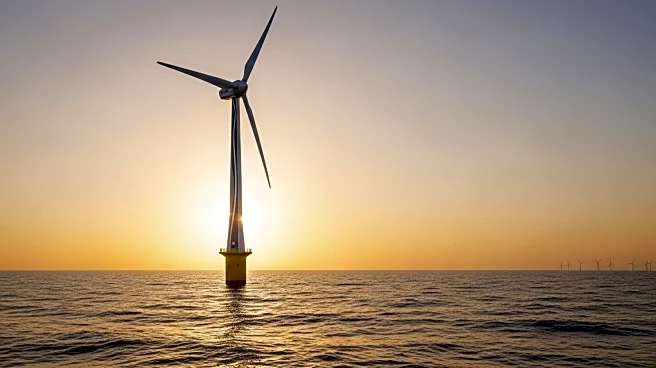What's Happening?
Denmark's Ørsted has initiated a $9.4 billion rights issue to strengthen its financial position amidst regulatory challenges and project cancellations. This capital infusion is intended to support Ørsted's 8.1 GW construction portfolio, including the Sunrise Wind project in the U.S., which has already incurred significant costs. The company is also divesting non-core assets to enhance liquidity. The rights issue comes as Ørsted faces political and regulatory volatility, including a stop-work order from the Trump administration on its Revolution Wind project, prompting legal action from Ørsted. Analysts have shown confidence in Ørsted's ability to adapt, maintaining or upgrading stock ratings.
Why It's Important?
The rights issue is crucial for Ørsted to maintain its leadership in the offshore wind sector, which is facing political and regulatory challenges. The U.S. offshore wind market is particularly volatile due to policy shifts, impacting Ørsted's projects. The company's ability to navigate these challenges will influence its long-term resilience and the broader sector's adaptation to political and technological changes. The rights issue provides short-term liquidity, but long-term success will depend on policy reforms and innovative financial risk management strategies.
What's Next?
Ørsted's legal battle with the Trump administration over the Revolution Wind project highlights the sector's vulnerability to policy changes. The company will need to continue adapting to regulatory environments in key markets like the U.S. and Germany. Future developments may include policy reforms and increased use of financial tools to secure investment-grade ratings for projects. Ørsted's success will depend on its ability to leverage these strategies and maintain its competitive edge in the offshore wind industry.
Beyond the Headlines
The offshore wind sector's resilience is supported by stable returns from power purchase agreements and low default rates compared to traditional energy assets. Innovations in cleantech manufacturing and AI-driven grid optimization are expected to bolster demand for renewables. Ørsted's strategic capital allocation reflects a shift from aggressive expansion to risk mitigation, emphasizing the importance of financial and regulatory pathways in project development.










